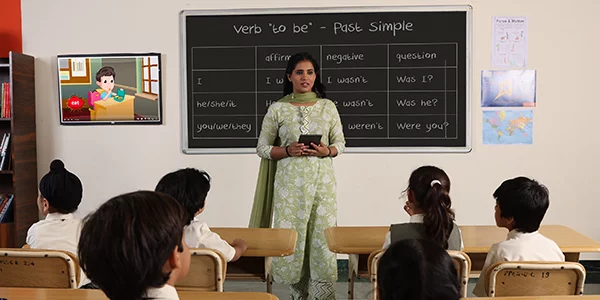Get Top Results with Primary Science Tuition Singapore from Experienced Tutors
Get Top Results with Primary Science Tuition Singapore from Experienced Tutors
Blog Article
Discovering the Various Teaching Methods in Key Scientific Research Education And Learning Today
The landscape of primary science education is progressing, with different training techniques acquiring prestige in modern classrooms. Inquiry-based understanding, hands-on experiments, and the integration of technology are redefining just how educators engage young minds. In addition, collaborative techniques and distinguished instruction are being used to cater to the diverse needs of students, boosting both involvement and understanding. As we examine these methods, questions emerge about their performance and the ramifications for future academic techniques. What might these shifts in approach mean for the following generation of learners?
Inquiry-Based Discovering
Inquiry-Based Discovering (IBL) is a pedagogical technique that urges students to explore scientific concepts through questioning, investigation, and hands-on trial and error. This technique highlights the duty of students as active participants in their understanding, promoting essential thinking and problem-solving abilities. By involving with real-world concerns, trainees end up being determined and curious, which boosts their understanding of scientific concepts.
In IBL, educators work as facilitators, directing students as they browse their questions as opposed to providing info directly. This student-centered technique enables differentiation, fitting various finding out speeds and designs. Pupils develop abilities in developing theories, making experiments, and analyzing data, which are essential for clinical literacy.
Additionally, IBL cultivates partnership amongst students, encouraging them to share findings and ideas. This cumulative questions advertises social skills and a sense of community within the class. The process of inquiry urges resilience, as pupils discover to welcome failure as a tipping rock toward understanding.
Hands-On Experiments
Hands-on experiments are an essential component of effective scientific research education and learning, matching the principles of inquiry-based knowing. These experiments allow pupils to involve directly with clinical ideas, fostering a much deeper understanding via experiential understanding. By adjusting materials and observing outcomes, young learners can grasp abstract theories in concrete methods.
Such activities promote important reasoning and problem-solving abilities, as pupils hypothesize results, conduct experiments, and analyze results. This process urges them to ask inquiries, fine-tune their understanding, and develop a clinical way of thinking. Hands-on experiments can be tailored to varied learning designs, guaranteeing that all trainees have the chance to engage meaningfully with the content.
Moreover, hands-on experiments frequently urge cooperation among peers, promoting team effort and communication abilities. Functioning in groups makes it possible for pupils to share concepts, review findings, and gain from one another, which boosts their total academic experience.
Integrating hands-on experiments right into the key scientific research educational program not only enriches the discovering setting however likewise cultivates a long-lasting interest in scientific research. By proactively participating in their education, students are most likely to develop a passion for clinical query that extends past the classroom.

Modern Technology Combination
Incorporating technology right into primary scientific research education and learning has actually ended up being increasingly necessary in cultivating trainee interaction and boosting learning results. Using digital devices, such as interactive simulations, digital labs, and academic software, provides pupils with possibilities to discover scientific principles in cutting-edge methods. you can find out more These sources facilitate a deeper understanding of complicated topics by permitting students to envision and control variables that would be not practical in a traditional classroom setup.
Moreover, technology integration encourages individualized discovering experiences. Pupils can progress at their own rate, reviewing difficult ideas with multimedia sources, which cater to various learning styles. This versatility not only supports private development however also cultivates a sense of freedom in learners.
Additionally, innovation acts as a bridge to real-world scientific research, attaching pupils with existing research study and expert contributions. Accessibility to on-line data sources and scientific journals widens trainees' perspectives on scientific questions and cultivates critical assuming skills.
Collaborative Discovering
Collective discovering plays a vital role in main science education by promoting synergy and interaction abilities among pupils. This approach encourages students to interact, share knowledge, and participate in analytic, which boosts their understanding of clinical principles. By joining group activities, students learn to express their ideas, pay attention to varied viewpoints, and discuss solutions, all of which are important skills in both scholastic and real-world contexts.

Research suggests click now that joint knowing can bring about enhanced inspiration and involvement in science topics, as students discover enjoyment in common experiences (primary science tuition Singapore). Additionally, this approach prepares trainees for future collaborative ventures, equipping them with the skills essential for effective teamwork in college and professional atmospheres. Ultimately, accepting collective learning in key science education and learning can dramatically improve the discovering experience and advertise a much deeper understanding of scientific query
Differentiated Instruction

Set apart guideline can materialize in numerous ways, such as differing the material, procedures, or products of discovering. Instructors might use tiered projects that supply differing degrees of intricacy, allowing students to function at their corresponding preparedness levels. In addition, versatile grouping methods can help with partnership among trainees Going Here with various capabilities, promoting peer knowing.
Evaluation plays a crucial role in this technique, as it notifies guideline and aids instructors recognize each pupil's one-of-a-kind requirements. Developmental assessments, such as observations and quizzes, can assist teachers in readjusting their approaches to improve discovering end results. primary science tuition Singapore. Ultimately, by applying differentiated direction in main science education and learning, teachers can cultivate an extra reliable and fair understanding atmosphere, equipping all students to reach their complete potential in recognizing clinical phenomena
Conclusion
In summary, the diverse training techniques in main science education and learning, including inquiry-based discovering, hands-on experiments, innovation integration, collective knowing, and set apart instruction, jointly add to an extra reliable understanding setting. These techniques advertise essential reasoning, analytical abilities, and a deeper comprehension of clinical principles. By executing these strategies, educators can create supportive and engaging class that address the varied requirements of students, ultimately cultivating a lifelong passion in scientific research and improving scholastic achievement.
Inquiry-Based Knowing (IBL) is a pedagogical technique that urges trainees to explore scientific concepts via wondering about, investigation, and hands-on trial and error.Collaborative discovering plays a vital role in primary scientific research education by fostering team effort and interaction skills amongst students.Study suggests that joint discovering can lead to increased motivation and engagement in science subjects, as students locate enjoyment in common experiences.In cultivating a comprehensive knowing atmosphere, separated guideline arises as a crucial method to fit the varied needs and abilities of pupils in primary science education. Inevitably, by implementing set apart direction in main scientific research education, instructors can grow a much more fair and reliable knowing environment, empowering all trainees to reach their full possibility in recognizing scientific phenomena.
Report this page